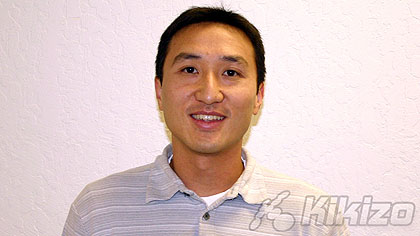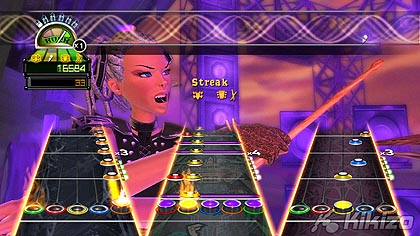Making Guitar Hero: Kai Huang Interview
We talk to RedOctane president and co-founder about his remarkable success story, Guitar Hero World Tour, the future of the series and the music game masterplan.
Page 2
Kikizo: Back in the day, you started with game rentals and basic peripherals. Now, things must be very different for you. Not many things in gaming see a metroeic rise quite like this - how do people react to you now versus back then?
Huang: Yeah, a lot of things have changed in the last three years, since Guitar Hero came on the scene and really introduced people to the music gaming genre. In 2006, music gaming as a category was $250m in North America - all music games. In 2007, that grew to $1.2bn. So that was a 5X increase - it became the biggest genre by far; the next biggest genre was first person shooters, which was $700m. And this year, I believe the music gaming genre is going to grow to well over $2bn. So, this particular space of video games continues to grow, and Guitar Hero has been a huge part of that.
And that's changed a lot of things! You know, the first game we tried to launch, artists wouldn't license us the music. That was one of the reasons we went to re-records, is because artists turned us down. They said: "Don't know what this game is, you have nothing to show us, not interested in licensing our music to you". Now, three years later, artists are interested in coming to us, recognising that Guitar Hero is a new platform for them where they can reach totally new audiences - people that either didn't listen to rock, or who were too young and didn't really grow up with the type of rock that's in the game. Guitar Hero Aerosmith is a great example of that collaboration, where they recognise that they can really reach all kinds of people they've never been able to touch before, and that that would help them in their album sales. So now artists are coming to us, rather than us having to fight to get their music in the game.
Kikizo: But it's not just the music industry bowing down - what about the games industry? I mean it must be quite gratifying to go from a position where you were scrapping around for attention in gaming, to a reported $100m to buy you, the rights, the whole thing. That in itself is a change of awesome proportions...
Huang: Right! Yeah, we started in 1999, and you did your homework! You know, we said we did the game rentals and accessories - we were knocking on a lot of doors, you know? When we launched Guitar Hero, we had to go out and find all the different partners. Line 6 was one of them, which is now they're a great partner for us as they're integrated into the game. But when we went out originally to all of the instrument manufacturers, again most of them just flat out said "no, we're not interested in working with you guys". So that's changed, the music industry has changed, different partners we wanted to work with changed. Now, we pick up the phone to somebody and say we'd love to work with you... and we get a call back! Three years ago it was hard to get a call back. So a lot of things have definitely changed for us, in just a few years.
Kikizo: It seems obvious that passion is what got you started in games, but how much of your success is down to entrepreneurial spirit, and do you think there was an element of luck, considering the proportion of the success we're talking about?
Huang: There's always luck in business, and we've certainly been very lucky. But the way I think about it is that luck generally plays a very small part. I think from the business side and as an entrepreneur, you really have to focus on putting yourself in the right place the right time. The problem most people have when they fail, is they'll say "oh, he was lucky". Well, that person wasn't lucky; he put himself at the right place, at the right time. You didn't see the ten years or twenty years that he's probably struggled, that he did a lot of hard work, and that he put himself in the right place at the right time. People will say he was lucky, the truth is, he wasn't lucky. And that's kind of how I think about business - and what I always tell aspiring entrepreneurs - that you've got to keep your eyes open and see what's out there. You've got to put yourself in the right place at the right time! And when that luck comes - and it always does - you need to be able to ride that wave in - you have to be prepared, because most people aren't prepared and when the luck comes, it just washes right over them, and they didn't even know it was there.
Kikizo: So you've got the Neversoft boys taking care of the development side of things, but what's your personal role? On this latest game for example - do you exec produce, oversee, give feedback...?
Huang: No feedback needed with these guys! They're kicking ass on their own, I would probably only detract from what they're doing, if I gave them feedback! So for me it's mostly the business aspects of managing this sort of big and growing franchise. We've got all the business relationships that we have to put together for this game, whether it's the music industry, instrument companies, all of the brand partners that we have in the game. From the marketing side, all the PR and activity that we do, the tours that we go out on, sending buses out and giving people chances to try Guitar Hero and get their hands on it. Coordinating the hardware and software into production, and make sure that it all comes together at the right time, so we can actually physically deliver these products and put them on the shelf and into customers' hands. That's what I generally focus on is coordinating that business.
Kikizo: And you now do that as an 'employee' of Activision? Or is it more complicated than that in terms of the current structure?
Huang: Right. RedOctane is a business unit within Activision. Since out acquisition, we've sort of run as an independent business unit, so generally, products that we choose to work on, new businesses that we want to be in, we have sort of control over what we want to do in the future, and that's how we manage our business - with a free hand if you will.













 Satoru Iwata Video Interview - the late Nintendo president spoke with Kikizo in 2004 as 'Nintendo Revolution' loomed.
Satoru Iwata Video Interview - the late Nintendo president spoke with Kikizo in 2004 as 'Nintendo Revolution' loomed. Kaz Hirai Video Interview - the first of Kikizo's interviews with the man who went on to become global head of Sony.
Kaz Hirai Video Interview - the first of Kikizo's interviews with the man who went on to become global head of Sony. Ed Fries Video Interview - one of Xbox's founders discusses an epic journey from Excel to Xbox.
Ed Fries Video Interview - one of Xbox's founders discusses an epic journey from Excel to Xbox. Yu Suzuki, the Kikizo Interview - we spend time with one of gaming's most revered creators.
Yu Suzuki, the Kikizo Interview - we spend time with one of gaming's most revered creators. Tetris - The Making of an Icon: Alexey Pajitnov and Henk Rogers reveal the fascinating story behind Tetris
Tetris - The Making of an Icon: Alexey Pajitnov and Henk Rogers reveal the fascinating story behind Tetris Rare founders, Chris and Tim Stamper - their only interview? Genuinely 'rare' sit down with founders of the legendary studio.
Rare founders, Chris and Tim Stamper - their only interview? Genuinely 'rare' sit down with founders of the legendary studio. The History of First-Person Shooters - a retrospective, from Maze War to Modern Warfare
The History of First-Person Shooters - a retrospective, from Maze War to Modern Warfare